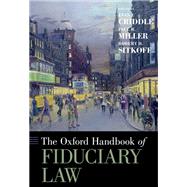The Oxford Handbook of Fiduciary Law provides a comprehensive overview of critical topics in fiduciary law and theory through chapters authored by leading scholars. The Handbook opens with surveys of the many fields of law in which fiduciary duties arise, including agency law, trust law, corporate law, pension law, bankruptcy law, family law, employment law, legal representation, health care, and international law. Drawing on these surveys, the Handbook offers a synthetic analysis of fiduciary law's key concepts and principles.
Chapters in the Handbook explore the defining features of fiduciary relationships, clarify the distinctive fiduciary duties that arise in these relationships, and identify the remedies available for breach of fiduciary duties. The volume also provides numerous comparative perspectives on fiduciary law from eminent legal historians and from scholars with deep expertise in a diverse array of the world's legal systems. Finally, the Handbook lays the groundwork for future research on fiduciary law and theory by highlighting cross-cutting themes, identifying persistent theoretical and practical challenges, and exploring how the field could be enriched through empirical analysis and interdisciplinary insights from economics, philosophy, and psychology.
Unparalleled in its breadth and depth of coverage, The Oxford Handbook of Fiduciary Law represents an invaluable resource for practitioners, policymakers, scholars, and students in this essential field of law.








